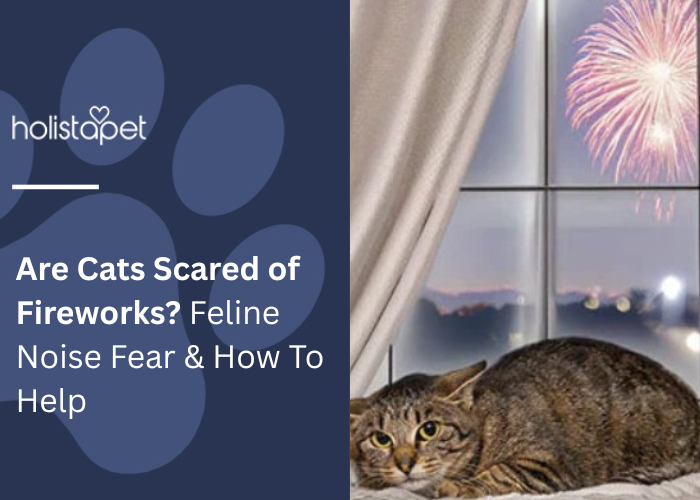Cats and fireworks go together like baths and houseplants, aka, they don't. So if you're wondering, are cats scared of fireworks?, think about how you'd respond to surprise explosions in your living room.
Your kitty hears fireworks from miles away, thanks to their acute sense of hearing. The booming sounds and flashing lights are a sensory overload. No wonder so many felines tend to hide or freeze when the sky lights up with bangs.
Why Do Fireworks Scare Cats?

Fireworks are loud, random, and impossible to predict. That kind of chaos is terrifying for a cat. That mix of sudden loud noises and confusion throws their instincts into overdrive. To them, fireworks don't mean celebration; instead, they scream danger. And when something feels unsafe, most cats act fast: run, hide, and stay put until the scary part's over.
Sensitive Hearing & Sudden Loud Noises
Cats' ears pick up sounds we can't even register. When fireworks go off, those deafening bangs hit them like a sonic boom.Their acute sense of hearing means even distant fireworks feel close. Sudden noises, especially the sharp kind, trigger thatbuilt-in survival instinct. Your cat might seem mellow most days, but fireworks can flip the switch from chill to freaked-out in seconds because of their sensitive ears.
Flashing Lights and Vibrations
A frightened cat doesn't know if those bright flashes mean lightning, danger, or some unknown threat. To them, flashing lights feel like something's coming to get them.
Even the vibrations from a fireworks display can mess with their nerves. Their paws and whiskers are highly sensitive, so when the house rumbles, they feel it. Add that to the lights and noise, and you've got a perfect storm.
Signs Your Cat Is Scared of Fireworks

If your cat starts acting strange during fireworks season, there's a good chance they're genuinely rattled. Watch closely, and you'll spot clues like:
- Pacing or Hiding. If your cat is suddenly glued under the bed or doing laps around the house, they're probably trying to get away from the chaos.
- Shaking or Panting. Shaky paws or fast breathing are signs of real discomfort.
- Excessive Meowing. Blaring or frequent meows can be your cat's way of saying things are not okay.
- Aggressive Behavior. A normally sweet kitty might swipe or hiss if they're feeling cornered and frightened.
Are All Cats Afraid of Fireworks?
No, not every cat hits the panic button when fireworks start. Some might barely twitch an ear while others act like the world's ending. Just like humans, cats all respond differently. So if your friend's kitty naps through fireworks but yours turns into a furry ninja, it's normal.
That said, most cats tend to be at least a little uneasy around fireworks. Their sharp senses and strong survival instincts contribute to their fireworks aversion, making it hard to ignore loud, unpredictable chaos.
Breed, Personality, and Past Trauma Matter
A cat's breed can play a small role, but personality steals the show. Shy or skittish cats usually respond more strongly to sudden loud noises like fireworks. Bold, curious felines might remain cool (or at least fake it better).
If your pet's had a rough past, like rescue cats sometimes do, those old fears can come back fast. A traumatic or stressful experience can stick in their memory. So when the fireworks start, they're reliving moments they'd rather forget.
Indoor vs. Outdoor Cat Reactions
Indoor cats might panic, but at least they're already inside with you. They hear fireworks, maybe cower under the couch, and wait it out.
Outdoor cats are a whole different story. They're exposed to booming bangs, flashing skies, and nowhere safe to run if startled. Some outdoor cats will sprint for the nearest hiding spot or worse, try to escape and end up lost.
How Long Do Firework Fears Last in Cats?
A quick scare might last just a few minutes, but for some cats, that nervous energy can stick around for hours or even days. It all depends on their personality and how intense the fireworks were.
If your cat avoids certain rooms or acts differently for days after, it could be more than just firework jitters. Lingering fear might mean your pet needs extra help to stay calm during the fireworks season. Pay attention to patterns because they'll tell you what your cat really needs.
What To Do if Your Cat Is Scared of Fireworks
First step: Don't panic because your cat's already doing enough of that. If they're afraid of fireworks, the goal is to make them feel safe without adding more tension. Stay chill, stay calm, and create a vibe that says, "Hey buddy, you're okay."
Most cats just want one thing: a quiet place where the booms can't find them. Keep them inside, lower the volume on the chaos, and resist the urge to hover. Your mellow energy sets the tone.
Create a Safe, Quiet Hiding Spot
Give your worried cat a cozy space where they can curl up and feel protected. Think one room with low lights, soft blankets, and a spot to burrow.
You don't need to build a fortress. A cardboard box with a towel can feel like a luxury bunker to a nervous kitty. Add their favorite toy or a worn shirt that smells like you. The goal is to make their hiding spot feel like the safest space in the universe.
Block Out Noise With White Noise or Music
Turn on white noise, soft classical music, or a soothing playlist made for cats. It won't erase the fireworks, but it helps take the edge off those sudden noises.
Place the speaker near their hiding spot but not too close. You want to soothe, not scare. A steady background sound masks the bangs and helps your cat stay calm instead of jumping at every pop.
Natural Ways To Calm a Cat During Fireworks
Natural options can go a long way in turning a stressful time into a manageable one. You don't need anything fancy, just some smart, gentle tools that support a sense of calmness. Here are some solutions:
- CBD Calming Treats Drops From HolistaPet. Our plant-based CBD Calming treats help keep your cat calm and reduce fear without knocking them out. They are easy to administer for soothing relief.
- Noise Blocking Earmuffs for Pets. Yes, they exist. And they're adorable and practical.
- Pheromone Diffusers and Soft Blankets. Mimic mama cat vibes and create instant comfort.
Should You Comfort a Cat During Fireworks?

Yes, but do it gently. If your cat comes to you during fireworks, they're looking for reassurance. Soft voices, slow movements, and chill energy can help them feel a little safer in all the chaos.
Avoid grabbing or forcing cuddles, as that can make things worse. Let your cat lead. Sit nearby, offer your hand, and speak softly. You're not reinforcing fear by being kind; you're reminding them they're not alone in the middle of the noise storm.
Prepping Your Cat for Fireworks Season
A little planning can make a big difference when fireworks season rolls around. Start small and build a routine that helps your cat stay chill even when things get loud.
- Desensitization and Routine Changes. Play soft firework sounds in short bursts and reward chill behavior. Shift feeding times or litter tray locations early, so nothing feels sudden.
- Vet Visits or Anxiety Assessments. If your cat's reactions are intense, a quick chat with the vet can help you figure out the best soothing tools or wellness products.
Are Fireworks Dangerous for Cats?
They can be. Fireworks may seem like harmless fun to humans, but for cats, they can bring real risks. Scared cats might run into traffic, hide somewhere dangerous, or injure themselves while trying to escape.
Even cats indoors aren't totally safe. The distress alone can cause physical discomfort, upset stomachs, or changes in behavior. So yes, fireworks can be dangerous, especially for cats with very sensitive hearing or anxious behaviors.
Risks for Outdoor Cats During Celebrations
Outdoor cats face more than just loud noises during fireworks season. Flashing lights and explosions can send them running blindly, sometimes far from home. Even felines that usually roam with confidence can get disoriented and lost.
Bonfire night or New Year's Eve can also bring crowds, cars, and chaos. A scared cat darting through traffic or hiding under a vehicle isn't safe. If you expect fireworks, it's best to keep your cat inside.
Indoor Hazards Like Open Windows or Doors
A cracked window or open door becomes an easy escape route for a scared cat. One loud bang, and they might bolt without thinking twice. Cats tend to react fast when they feel trapped or unsafe. That means screen doors, cat flaps, and barely open windows can turn into emergency exits.
On fireworks night, secure the house. Close those gaps and double-check the locks. Better safe than chasing your runaway cat through the neighborhood.
Can Fireworks Cause Long-Term Anxiety in Cats?

Yes, they absolutely can. Some cats carry that fear long after the sky goes quiet. If your kitty hides for days or acts jumpy with small noises, the fireworks might've left a lasting impression.
Look for signs like changes in appetite, bathroom habits, or behavior. If they seem tense long after the last boom, they may need more than a one-night fix. Ongoing calming support, like a wellness product or daily routine change, could help reduce fear over time.
When To Talk to a Vet About Firework Fear
If nothing's working and your cat's still acting like fireworks are falling from the ceiling, call the vet. Hiding for days, skipping meals, or showing behavior changes means it's more than a one-night scare.
A vet can check for deeper issues or suggest calming tools that help. Sometimes our feline friends need a little extra support to feel secure again, so don't hesitate to get professional advice.
Final Thoughts – Helping Your Cat Stay Calm During Fireworks
Fireworks might light up the sky, but they don't need to wreck your cat's night. With a few smart moves and a lot of love, you can help your kitty feel safe, even during the loudest shows. Tune into their needs and create calm where you can.
If you need a little extra help, HolistaPet has calming CBD treats and drops made just for cats. Keep your cat inside, keep them cozy, and let the booms stay outside where they belong.
See more blogs on cat care!







![Probiotics For Dogs [Soft Chews] - HolistaPet](http://www.holistapet.com/cdn/shop/files/Probiotic-Infographic-1_472d7a29-e30c-435a-9638-1365d8c3a9f9.jpg?v=1725384841&width=104)





























Leave a comment
All comments are moderated before being published.
This site is protected by hCaptcha and the hCaptcha Privacy Policy and Terms of Service apply.